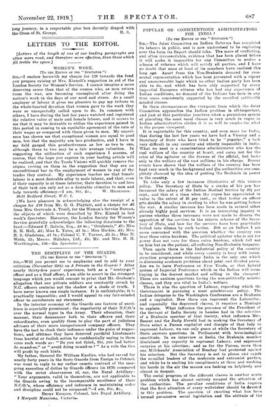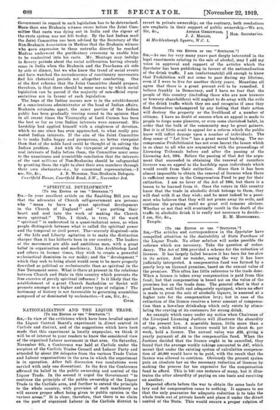POPULAR OR CONSCIENTIOUS ADMINISTRATORS FOR INDIA ?
[To THE EDITOR or THE " Sescrsvon.")
Sia,—The Joint Committee on Indian Reforms has completed its labours in public, and is now understood to be cogitating over the form its Report should take. The mass of conflicting, and often irreconcilable, evidence that has been placed before it will make it impossible for any Committee to evolve a scheme of reforms which will satisfy all parties, and I have no doubt that some at least of its members have realized this long ago. Apart from the Non-Brahmin demand for com munal representation which has been presented with a vigour and unanswerable logic which no other Indian party has been able to do, and which has been ably supported by every impartial European witness who has had any experience of Indian conditions, no demand of the Indians has been in any true sense consistently supported by the so-called politically minded classes.
In these circumstances the viewpoint from which the Joint Committee approaches the Indian problem is all-important, and just at this particular juncture when a pernicious system of placating the most vocal classes is very much in vogue in Indian administrative circles it is as well to emphasize what is the proper viewpoint.
It is regrettable for this country, and oven more for India,
that during the last few years we have had a Viceroy and a Secretary of State who have tried to be " popular," a task very difficult in any country and utterly impossible in India. What we need is a conscientious administrator who has the real welfare of the country at heart, and cares not for the cries of the agitator• or the frowns of the official, but looks only to the welfare of the vast millions in his charge. Recent events have shown that the welfare of the country has been kept very much in the background and khe authorities are completely obsessed by the idea of putting the Brahmin in power in the country.
To take only a few instances illustrative of this vicious policy. The Secretary of State by a stroke of his pen has increased the salary of the Indian Medical Service by 33i por cent., and this at a time when the rupee has appreciated in value to the extent of 35 per cent., so that to-day an officer• gets double the salary in sterling to what he was getting before the war. A similar increase has been made in several other already highly paid services. It is an interesting inquiry te pursue whether these increases were not made to disarm the opposition of the services to the reform scheme of the Secretary of State, and how far the services have been practically bribed into silence by such tactics. Bitt as an Indian I am more concerned with the question whether the country can bear these extra burdens. The political agitator who is out for power does not care for these extra burdens, which fall not on him but on the patient, all-suffering Non-Brahmin taxpayer•.
Then again there is the Industrial policy of the country to be considered, and while every country is busy with reconstruction programmes unhappy India is the only one which ' is discussing academic problems about joint and divided purse. Are we to have Preference or Free Trade, or that hybrid system of Imperial Preference which to the Indian will meal: buying in the dearest market and selling in the cheapest': These are anxious questions facing the non-politically minded classes, and they are vital to India's welfare.
There is also the question of Labour, regarding which ths
Government is pursuing a most mischievous policy. The Indian delegates to the Washington Conference are a Brahmin and a capitalist. How these can represent the Labourites, and especially the depressed classes, it requires a Montagu to explain. What influence the presence of the President of the Servant of India Society in London had in the selection of a Brahmin member of that Society, what influence Mrs. Besant and the Daily Herald had in making the Secretary of State select a Parsee capitalist and disciple of that lady to represent Labour, we can only guess at while the Secretary of State answers questions in Parliament with terminological exactitude. In an interview in India the Brahmin member disclaimed any capacity to represent Labour, and expressed surprise at his selection; and as for the Parsee, more than one Mill-hands' Association of Bombay had protested against his selection. But the Secretary is out to please and cajole the so-called leaders of the moderate and extremist parties, and while he is smiling his compliments at them and washing his hands in the air the masses are looking on helplessly and almost in despair.
The social progress of the different classes is another acute
problem which has almost entirely escaped the attention of the authorities. The peculiar conditions of India require that the first attention of every wellwisher should be devoted to this problem. The question of enacting what has been termed permissive social legislation and the attitude of the
Government in regard to such legislation has to be determined. Mores-than one Brahmin witness swore before the Joint Committee that caste was dying out in India and the rigour of the-caste system was not felt to-day. By the last Indian mail the Joint Committee has been advised by the Secretary of the Non-Brahmin Association in Madras that the Brahmin witness who gave expression to these untruths directly he reached Madras underwent the purificatory ceremony to enable him to be readmitted into his caste. Mr. Montagu may indulge in flowery periods about the social millennium having already come in India when the Brahmin and the Panchama sit side by side at dinner, but we who know the trend of social events and have watched the recrudescence of reactionary movements find his rhetorical periods not altogether comforting. One of the first reforms that the Joint Committee should propose, therefore, is that there should be some means by which social legislation can be passed if the majority of non-official representatives are in favour of such legislation.
The hope of the Indian masses now is in the establishment of a conscientious administrator at the head of Indian affairs. Brahmin estimates apart, the saner portion of the Indian public has been gradually veering round to the opinion that in all recent times the Viceroyalty of Lord Curzon has been the best so far as true Indian interests were concerned. His Lordship had applied himself with a singleness of devotion. which no one since has even approached, to what really promoted Indian interests. If the aim of the Joint Committee is to make India happy and prosperous, no better viewpoint than that of the noble Lord could be thought of in solving the Indian problem. And with the viewpoint of promoting the real interests of India before them, the Committee must come to the unanimous and irresistible conclusion that the interests of the vast millions of Non-Brahmins should be safeguarded by granting them the right to elect their own members through their own electorates–..e., by communal representation.—I am, Sir, &e., A. R. MUDAHAR, Non-Brahmin Delegate. Courtfield House, Courtfield Road, S.W., November 3rd.







































 Previous page
Previous page